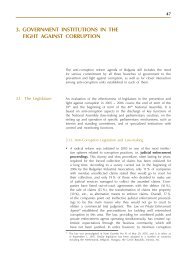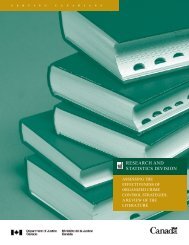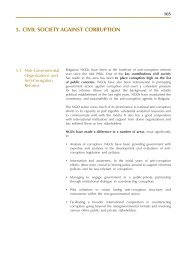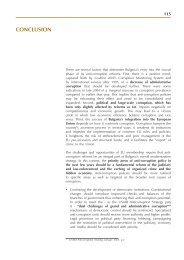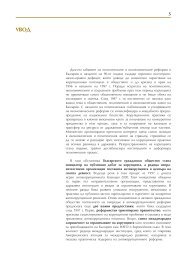National Threat Assessment 2008. Organised Crime - Politie
National Threat Assessment 2008. Organised Crime - Politie
National Threat Assessment 2008. Organised Crime - Politie
Create successful ePaper yourself
Turn your PDF publications into a flip-book with our unique Google optimized e-Paper software.
5.2.2 Corruption of public servants<br />
Scope<br />
Corruption of public servants is considered to be the misuse of public servant<br />
powers to perform an act or omit that act for the benefit of a third party,<br />
as a result of which personal gain is obtained in the form of financial or other<br />
favours. In this NTA, the ‘third party’ mainly refers to representatives of criminal<br />
organisations. The corrupt actions and omissions of the public servants involved<br />
are aimed at benefiting the criminal organisations. Not all forms of public<br />
servant corruption are discussed here: we will limit ourselves to corruption in the<br />
police forces, the Royal Netherlands Marechaussee and the Customs Service.<br />
General context<br />
Police<br />
Newspaper articles sometimes give the idea that criminals with a large bag of<br />
money go looking for potentially corruptible police officers, who are then bribed<br />
to supply information or to put an investigation on the wrong track. The experts<br />
interviewed have stated that this picture is fiction. Whilst criminals are always<br />
interested in contacts that could supply them with relevant information, there<br />
is no indication that criminals actively recruit such contacts, although they will<br />
seize the opportunity if it occurs. However, this does not change the fact that<br />
explicit attempts are made by organised criminal groups to recruit police officers<br />
as sources of information. The amounts of money involved are usually relatively<br />
small. Quite often the amounts for which people risk their careers are only a few<br />
thousand euros. Nevertheless, they still do so because there are other interests<br />
at stake, such as investing in friendship, family or love.<br />
In many of the cases identified there has been an existing relationship that was<br />
a (sometimes indirect) link to criminals. The pattern found in a large number<br />
of cases is that someone is enticed into supplying relatively unimportant<br />
information such as the name of the person who is the registered owner<br />
of a particular vehicle. Slowly but surely, the criminal contact then increases his<br />
grip on the supplier of information. The supplier may even end up participating<br />
in criminal activities.<br />
Apart from obtaining information from police officers (sometimes in return for<br />
money), it is theoretically possible for criminals to have someone from their own<br />
network infiltrate the investigating agencies with the aim of obtaining a position<br />
with access to information or of otherwise sabotaging criminal investigations.<br />
This will not occur more than incidentally, as infiltration is very time-consuming.<br />
Criminal organisations have much more efficient ways of obtaining information.<br />
It is not always guaranteed that a consideration will be provided in return for<br />
information, and if a consideration is provided, it does not have to be provided<br />
180 <strong>National</strong> <strong>Threat</strong> <strong>Assessment</strong> 2008 – <strong>Organised</strong> crime



